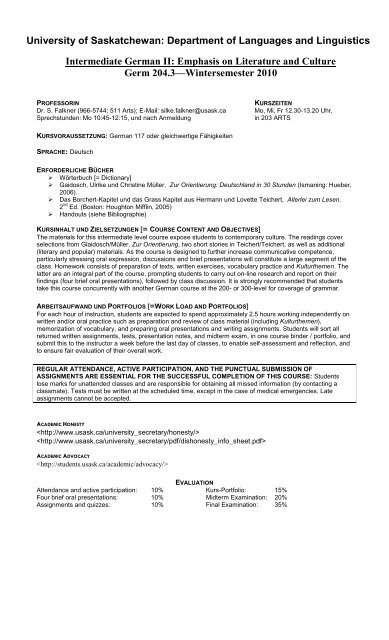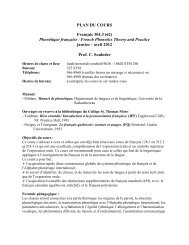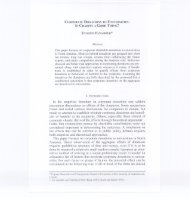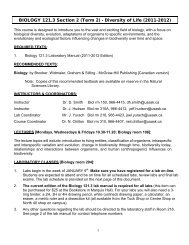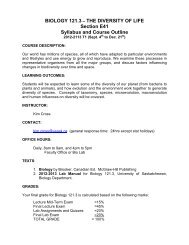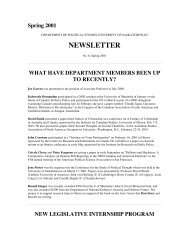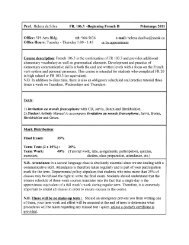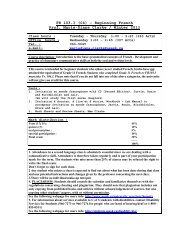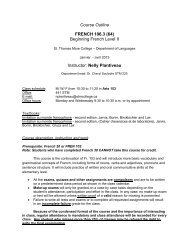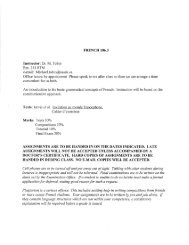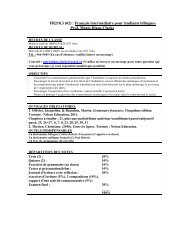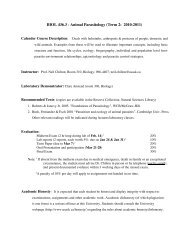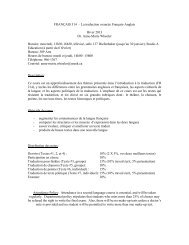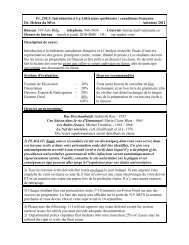University of Saskatchewan: Department of Languages and Linguistics
University of Saskatchewan: Department of Languages and Linguistics
University of Saskatchewan: Department of Languages and Linguistics
You also want an ePaper? Increase the reach of your titles
YUMPU automatically turns print PDFs into web optimized ePapers that Google loves.
<strong>University</strong> <strong>of</strong> <strong>Saskatchewan</strong>: <strong>Department</strong> <strong>of</strong> <strong>Languages</strong> <strong>and</strong> <strong>Linguistics</strong><br />
Intermediate German II: Emphasis on Literature <strong>and</strong> Culture<br />
Germ 204.3—Wintersemester 2010<br />
PROFESSORIN KURSZEITEN<br />
Dr. S. Falkner (966-5744; 511 Arts); E-Mail: silke.falkner@usask.ca<br />
Sprechstunden: Mo 10:45-12:15, und nach Anmeldung<br />
KURSVORAUSSETZUNG: German 117 oder gleichwertige Fähigkeiten<br />
SPRACHE: Deutsch<br />
Mo, Mi, Fr 12.30-13.20 Uhr,<br />
in 203 ARTS<br />
ERFORDERLICHE BÜCHER<br />
Wörterbuch [= Dictionary]<br />
Gaidosch, Ulrike und Christine Müller, Zur Orientierung: Deutschl<strong>and</strong> in 30 Stunden (Ismaning: Hueber,<br />
2006).<br />
Das Borchert-Kapitel und das Grass Kapitel aus Hermann und Lovette Teichert, Allerlei zum Lesen.<br />
2 nd Ed. (Boston: Houghton Mifflin, 2005)<br />
H<strong>and</strong>outs (siehe Bibliographie)<br />
KURSINHALT UND ZIELSETZUNGEN [= COURSE CONTENT AND OBJECTIVES]<br />
The materials for this intermediate level course expose students to contemporary culture. The readings cover<br />
selections from Glaidosch/Müller, Zur Orientierung, two short stories in Teichert/Teichert, as well as additional<br />
(literary <strong>and</strong> popular) materials. As the course is designed to further increase communicative competence,<br />
particularly stressing oral expression, discussions <strong>and</strong> brief presentations will constitute a large segment <strong>of</strong> the<br />
class. Homework consists <strong>of</strong> preparation <strong>of</strong> texts, written exercises, vocabulary practice <strong>and</strong> Kulturthemen. The<br />
latter are an integral part <strong>of</strong> the course, prompting students to carry out on-line research <strong>and</strong> report on their<br />
findings (four brief oral presentations), followed by class discussion. It is strongly recommended that students<br />
take this course concurrently with another German course at the 200- or 300-level for coverage <strong>of</strong> grammar.<br />
ARBEITSAUFWAND UND PORTFOLIOS [=WORK LOAD AND PORTFOLIOS]<br />
For each hour <strong>of</strong> instruction, students are expected to spend approximately 2.5 hours working independently on<br />
written <strong>and</strong>/or oral practice such as preparation <strong>and</strong> review <strong>of</strong> class material (including Kulturthemen),<br />
memorization <strong>of</strong> vocabulary, <strong>and</strong> preparing oral presentations <strong>and</strong> writing assignments. Students will sort all<br />
returned written assignments, tests, presentation notes, <strong>and</strong> midterm exam, in one course binder / portfolio, <strong>and</strong><br />
submit this to the instructor a week before the last day <strong>of</strong> classes, to enable self-assessment <strong>and</strong> reflection, <strong>and</strong><br />
to ensure fair evaluation <strong>of</strong> their overall work.<br />
REGULAR ATTENDANCE, ACTIVE PARTICIPATION, AND THE PUNCTUAL SUBMISSION OF<br />
ASSIGNMENTS ARE ESSENTIAL FOR THE SUCCESSFUL COMPLETION OF THIS COURSE: Students<br />
lose marks for unattended classes <strong>and</strong> are responsible for obtaining all missed information (by contacting a<br />
classmate). Tests must be written at the scheduled time, except in the case <strong>of</strong> medical emergencies. Late<br />
assignments cannot be accepted.<br />
ACADEMIC HONESTY<br />
<br />
<br />
ACADEMIC ADVOCACY<br />
<br />
Attendance <strong>and</strong> active participation: 10%<br />
Four brief oral presentations: 10%<br />
Assignments <strong>and</strong> quizzes: 10%<br />
EVALUATION<br />
Kurs-Portfolio: 15%<br />
Midterm Examination: 20%<br />
Final Examination: 35%
Bibliographie<br />
Borchert, Wolfgang. „Die drei dunklen Könige.― In: Teichert. Kapitel 3.<br />
Falkner: German 204 (Winter 2010)<br />
Brecht, Bertolt. „Wenn die Haifische Menschen wären.― In: Turneaure. 181-186.<br />
Gaidosch, Ulrike und Christine Müller. Zur Orientierung: Deutschl<strong>and</strong> in 30 Stunden. Ismaning: Hueber, 2006.<br />
Grass, Günter. „Die Rolltreppe.― In: Teichert. 123-131.<br />
Kunze, Reiner. „Element.― In: Turneaure. 209-215.<br />
Teichert, Hermann <strong>and</strong> Lovette. Allerlei zum Lesen. 2 nd Ed. Boston: Houghton Mifflin, 2005.<br />
Tourneaure, Brigitte M. Der treffende Ausdruck: Texte, Themen, Übungen. 2 nd Ed. New York: Norton, 1996.<br />
German 204.3: Vocabulary, Assignments, Presentations<br />
A. Vocabulary [= Wortschatz]<br />
The readings by Borchert <strong>and</strong> Grass are preceded by Wortschatz. For other readings, you will be expected to create<br />
your own vocabulary lists. Read <strong>and</strong> re-read the words, do Wortschatzanwendungen in writing. Practise the words by<br />
writing them, by using index cards, by having a friend read them out, etc.<br />
B. Writing Assignments [will be updated when new edition <strong>of</strong> Zur Orientierung is available]<br />
For the short stories, as well as for the chapters <strong>of</strong> Zur Orientierung, there will be writing assignments. Write 100-150<br />
words. Type the assignment, double-spaced, using correct spelling, <strong>and</strong> indicate your word-count [= Wortzahl]. After it<br />
is returned (marked-up), correct the assignment <strong>and</strong> keep both copies in your Kurs-Portfolio. You may use German<br />
spell check <strong>and</strong> grammar check (available in the Arts <strong>and</strong> Science Computer Labs; if you cannot find it, ask for help<br />
via: support@arts.usask.ca). Links to online-dictionaries <strong>and</strong> other sources are easily accessible through the<br />
<strong>Department</strong>al German Links page (http://www.arts.usask.ca/languages/German/ResourcesLinks.php), <strong>and</strong> the<br />
Library’s German Studies Subject Page (https://library.usask.ca/subject/german/articles). Beware <strong>of</strong> translation<br />
programmes—they are deadly.<br />
Type the assignment, double spaced, using correct spelling (be particularly aware <strong>of</strong> Umlaute <strong>and</strong> ß1). Remember:<br />
Even a short essay requires a title.<br />
1. Borchert: C, Zum Schreiben<br />
2. Grass: C, Zum Schreiben<br />
3. Kulturthema „Stolpersteine―: Was sind „Stolpersteine―? Wer hat sie entwickelt und warum? Wo gibt es<br />
„Stolpersteine―?<br />
4. Kulturthema: TBA<br />
5. Zur Orientierung, Kap. 1, Schulpflicht in Deutschl<strong>and</strong>: Beschreiben Sie das deutsche Bildungssystem.<br />
6. Zur Orientierung, Kap. 2, Demokratie / Rechtsstaat / Sozialstaat: Wählen Sie einen Begriff und erklären Sie<br />
ihn.<br />
7. Zur Orientierung, Kap. 3 A, Geschichte: S. 27, Nr. 5: Warum, glauben Sie, steht dieser Text im<br />
Grundgesetz?<br />
8. Zur Orientierung, Kap. 3 B, Geschichte: Wiedervereinigung / Migration nach Deutschl<strong>and</strong> / EU / Soziale<br />
Marktwirtschaft: Wählen Sie einen Begriff und erklären Sie ihn.<br />
9. Zur Orientierung, Kap. 4, Regionale Vielfalt: Suchen Sie Informationen über 5 regionale Spezialitäten<br />
(Essen) oder über 3 L<strong>and</strong>schaften. Beschreiben / erklären Sie!<br />
10. Zur Orientierung, Kap. 5, Menschen in Deutschl<strong>and</strong> / Kulturelle Orientierung: Gibt es Unterschiede in<br />
„Verhaltensregeln‖ zwischen Kanada und Deutschl<strong>and</strong>?<br />
D. Oral Presentations: Kulturthemen<br />
There are four very brief (max. 5 min.) oral presentations related to the Kulturthemen. Students are responsible for<br />
researching a number <strong>of</strong> names, places, concepts, events <strong>and</strong> companies, <strong>and</strong> then report on their findings. If possible<br />
<strong>and</strong> meaningful, present visuals via PPT or online (set up before class).<br />
1. Was ist es? (Person? Ort? Konzept / Idee? Firma? Event? Buch? Etwas <strong>and</strong>eres?)<br />
2. Wo? Wann? Für wen? Warum?—Present two more features about each item. (Correct any errors.)<br />
3. Wie? Was noch? [= What else?]—Provide further aspects about each person/place/concept/company or<br />
event (Correct any errors.)<br />
4. Select three Kulturthemen from your list <strong>and</strong> discuss in greater detail. (Correct any errors.)<br />
It is crucial that you are well prepared for your presentation, keeping in mind that grading will take into account content,<br />
your ability to speak freely (rather than read <strong>of</strong>f a sheet), <strong>and</strong> to be comprehended by your peers <strong>and</strong> the instructor.<br />
Keep vocabulary new to your peers to a minimum <strong>and</strong> prepare your listeners for any such new vocabulary (for<br />
example with notes written on the blackboard before class). File your notes in your Kurs-Portfolio.<br />
1 To create an Umlaut in Word without switching keyboard into German: Shift+Ctrl+; followed by the letter you want to<br />
umlaut, for an ß: Shift+Ctrl+7, followed by s.
Kurs-Portfolio für German 204.3<br />
Rationale: Provides a fairer reflection <strong>of</strong> student learning achieved<br />
= Grundprinzip: Ermöglicht eine gerechte Beurteilung der Lernerfahrung<br />
Falkner: German 204 (Winter 2010)<br />
Definition: A course portfolio is an organized collection <strong>of</strong> artefacts with a specific focus designed to<br />
monitor learning progress<br />
document actual learning<br />
highlight achievements<br />
allow self-assessment <strong>and</strong> reflection<br />
enable students to take ownership <strong>of</strong> learning<br />
assess achievement <strong>of</strong> learning outcomes<br />
= Definition: Ein Kurs-Portfolio ist der sichtbare Nachweis von Lernprozessen. Es<br />
dient dazu, Produkte und Leistungsbelege aus einem einzelnen Kurs zu sammeln und zu<br />
ordnen<br />
dokumentiert die Lernbiographie bzw. die Entwicklung des Lernenden<br />
erfasst systematisch Lernerfahrungen und -erfolge<br />
enthält persönliche Lernstrategien, sowie Reflexion und Evaluation der eigenen Person,<br />
Lerninhalte und Lernerfahrungen<br />
dient dem Leistungs- und Lernnachweis für Dozenten und Studierende<br />
Content (in a binder):<br />
1. Table <strong>of</strong> Contents<br />
2. Initial self assessment <strong>and</strong> reflection on learning goals <strong>and</strong> strategies (what do I want to learn;<br />
how am I going to go about this?)—about one page in German or English. This should also<br />
address how <strong>and</strong> where you have studied German so far<br />
3. All assignments <strong>and</strong> tests, information about your oral report<br />
4. Final self assessment <strong>and</strong> reflection on learning: What have I achieved, am I satisfied with my<br />
progress, what do I want next, <strong>and</strong> how may I get there (strategies). Approximately one page,<br />
in German or English. You must refer to your original objectives.<br />
= Inhalt (in einer Mappe oder einem Ringbuch):<br />
1. Inhaltsübersicht<br />
2. Eingangsreflexion: Selbsteinschätzung zu Beginn des Kurses; was will ich lernen und wie (mit<br />
welchen Strategien?) – etwa eine Seite ist genug. Deutsch oder Englisch. Hier muss auch<br />
stehen, wie Sie bisher Deutsch gelernt haben (z.B. in der High School, beim<br />
Schüleraustausch, in den Universitätskursen 114 und 117 etc.)<br />
3. alle Übungen, Aufgaben, Tests, sowie Informationen zum Referat<br />
4. Abschlussreflexion: Was habe ich gelernt, wo habe ich Fortschritte gemacht, bin ich zufrieden,<br />
was möchte ich weiter und wie will ich dahin (Strategien)? – Etwa eine Seite; Deutsch oder<br />
Englisch. Hier muss auf die Absichten der Eingangsreflexion Bezug genommen werden.<br />
Abgabetermine und Evaluation:<br />
Eingangsreflexion: Nach einer Woche (Montag, 11. Januar); wird danach zurückgegeben<br />
Kurs-Portfolio (ganze Mappe): Montag in der letzten Vorlesungswoche (Ostermontag, 5. April)<br />
Evaluation (15% der Gesamtnote):<br />
1. Organisation und Vollständigkeit<br />
2. Entwicklung (development / growth)<br />
3. Reflexionen und Strategien
Ungefährer Zeitplan für German 204.3<br />
Falkner: German 204 (Winter 2010)<br />
1. Woche (4. - 8. Januar)<br />
Montag, 4. Januar: Erster Vorlesungstag: Kennenlernen, Syllabus, H<strong>and</strong>reichungen, Kulturthemenkarten und<br />
Kurs-Portfolio erklären; erste Übung<br />
Mittwoch und Freitag: Borchert, „Die drei dunklen Könige“<br />
2. Woche (11. - 15. Januar)<br />
Montag, 11. Januar: Eingangsreflexion für Kurs-Portfolio abgeben<br />
Grass, „Die Rolltreppe“<br />
Montag: Kulturthemen I<br />
Zur Orientierung, Kapitel 1<br />
Zur Orientierung Kapitel 1 und 2<br />
Montag: Kulturthemen II<br />
Zur Orientierung Kapitel 2<br />
Zwischenprüfung, Montag, 8. Februar<br />
Zur Orientierung Kapitel 3 (Teil I)<br />
Montag: Kulturthemen III<br />
Zur Orientierung Kapitel 3 (Teil II)<br />
Zur Orientierung Kapitel 4<br />
Montag: Kulturthemen IV<br />
Zur Orientierung Kapitel 4<br />
3. Woche (18. - 22. Januar)<br />
4. Woche (25. - 29. Januar)<br />
5. Woche (1. - 5. Februar)<br />
6. Woche (8. - 12.Februar)<br />
15. - 19. Februar: Lesewoche (keine Veranstaltungen)<br />
7. Woche (22. - 26. Februar)<br />
8. Woche (1. – 5. März)<br />
9. Woche (8. – 12. März)<br />
10. Woche (15.- 19. März)<br />
Brecht, „Wenn die Haifische Menschen wären“<br />
Kunze, „Element“<br />
11. Woche (22. – 26. März)<br />
12. Woche (29. März – 2. April):<br />
Aufarbeiten und Wiederholung<br />
Fritag, 2. April: Karfreitag: Keine Veranstaltungen<br />
13. Woche (5. – 8. April):<br />
Ostermontag: Kurs-Portfolio einreichen<br />
Mittwoch, 7. April: Letzter Vorlesungstag (Format der Abschlussprüfung)<br />
Abschlussprüfungen: 10. - 30. April


